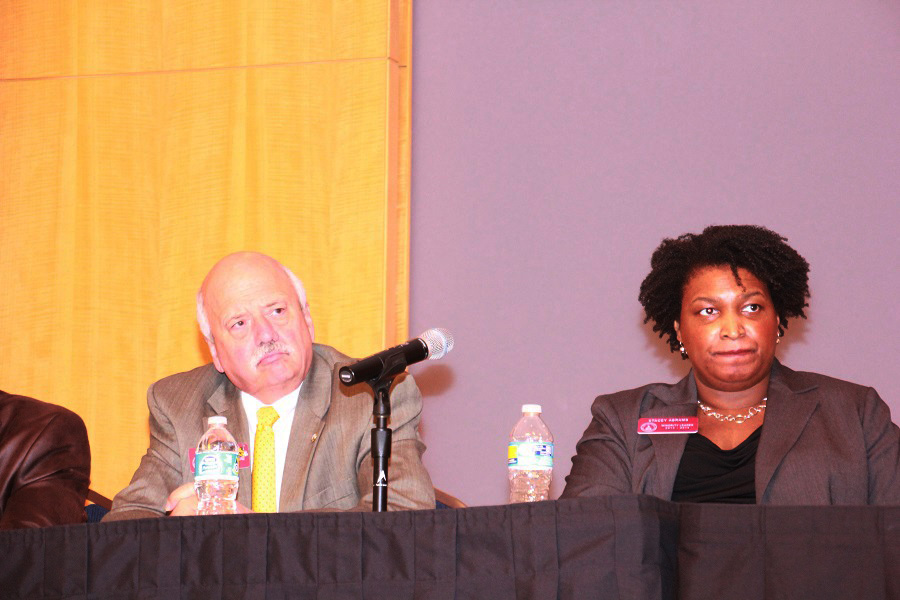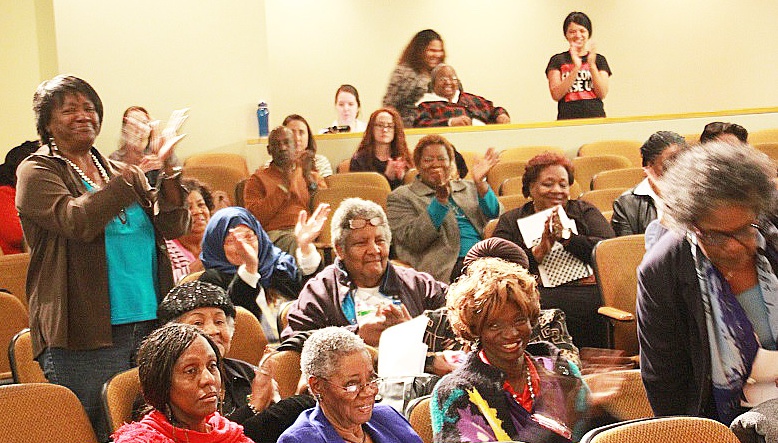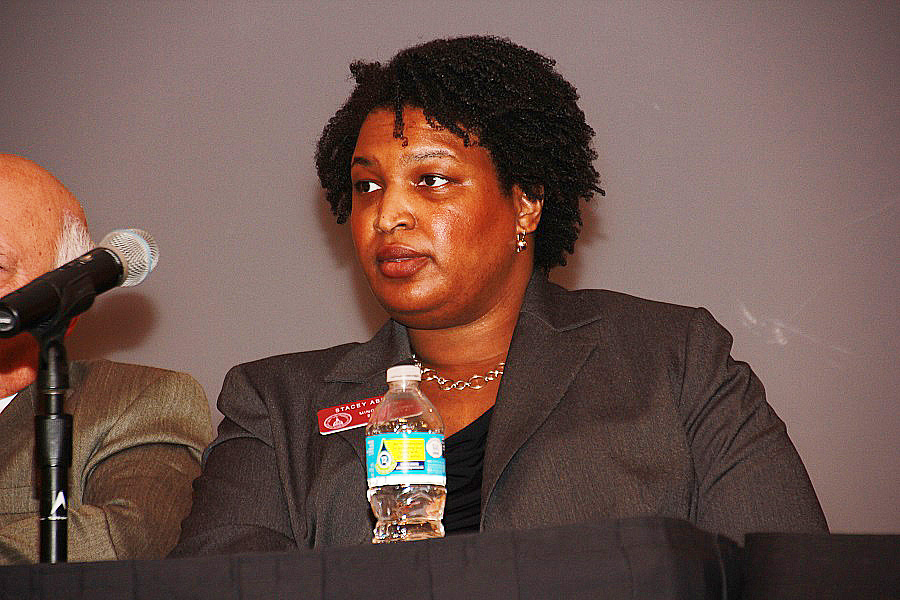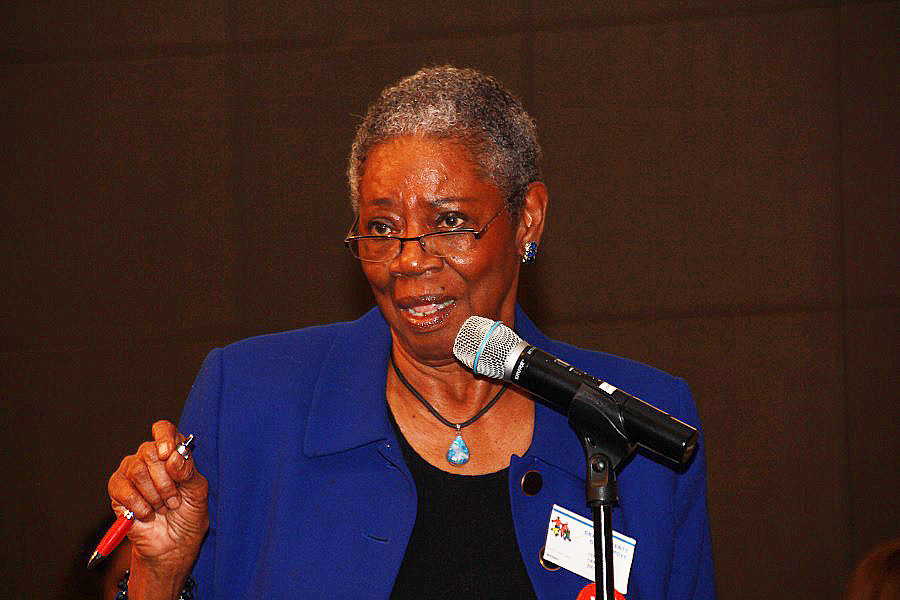
Not even the most grizzled and cynical person could have walked out of state Rep. Stacey Abram’s forum on kinship care at Georgia State University unaffected and with dry eyes. Person after person walked to the mic and delivered harrowing, devastating and heart-wrenching stories of being hopelessly entangled within the labyrinth of state bureaucracy when it comes to trying to adopt, and raise young extended family members.
One story in particularly blew everyone back in their seats.

Sheila Smith, who made the trek to Atlanta from Palmetto, Ga., announced that four of the five children that she has taken custody of from her daughter are autistic. “Every day is a struggle. One day, her daughter just dropped them off at her house and said she could no longer take care of them and asked me if I could. I said ‘yes.’ One of the children is suffering from deep depression because a classmate set her hair on fire. Another child had fallen out of the car while it was in motion (when he was in custody of the mother) and landed directly on his head and today suffers from severe headaches. And even though the mother said she could not raise these five children anymore, she nevertheless has gotten pregnant twice since, abandoning one of the babies at a South Carolina hospital. Smith needs help with housing (not enough room where she is) and transportation. Worse, she was notified that on Jan. 1, the state will take the kids off of Medicaid. “What is going on?” she asked in a pleading voice before dissolving into sobs.
One grandmother caring for her grandchildren testified to Abrams that she has a hole in her heart and that “I pray to God to let me live long enough to raise these children, because no one else is going to care for them and keep them together.” Yet another grandmother discussed how legal fees to gain formal custody have exhausted her financial reserves.
The emotionally exhaustive testimonies such as these is why state Rep. Stacy Abrams (D-Atlanta) embarked on a five-city tour to host a series of committee meetings so that citizens could share their stories. Just as importantly, Abrams said, the process will help show how keeping children with family members saves the state a lot of money in comparison to adoption or becoming wards of the state.

Abrams said she became aware of the complexity of problems that can occur with kinship care because of her own family’s experience. “In 2006 my parents first had to take custody of my niece. And navigating the system in Mississippi was difficult,” Abrams shared. “Just figuring out what they had to do just to have custody, and then when they decided that they wanted to adopt, just the rigors of going to court. Me, and one of my sisters is a lawyer, so we were able to help them navigate the system. It made me aware of just how difficult that process can be. And I started thinking about other families who may have been in that same situation, but lacking the resources and the access.”
Between 100,000 to 300,000 people are impacted by the kinship care problem in Georgia alone. Some families never report to the state that they’ve taken in extended family members. “In 2011 I was contacted by constituents who were facing issues regarding kinship care in DeKalb County and I started working on this issue,” Abrams said. “And my director of constituent services, Jenny Castillo and I, really started to dive into the conversation. And for the next few years we worked with the governor’s office and with DEFACS to address individual issues. But the more we did so, we realized there were systemic challenge that needed to address. To that end I worked with Gov. Deal in 2012 and 2013 to establish and expand the Kinship Care Navigators Program.”

Because of the myriad of problems families face, “we have to have a system that responds and responds quickly,” Abrams said somberly,but with a trace of steel resolution in her voice to fight for this neglected and too often ignored population.
“We need three things,” Abrams said:
- “Basic changes to the process. For example, looking at the legal fees. You shouldn’t have to pay to have a power of attorney and have to come up with $500 to $700, which could be the difference in paying the rent that month or not or pay for child care.”
- “At the very least, probate court and schools and hospitals understand what kinship caregivers have a right to do under the law and that we create a system that respects existing laws, but we also share information. For every person in that room, there were 300 to 500 that were not there.”
- “This is a legislative issue. We need to move forward to provide more resources to the families. The families are saving the state money. But for these grandparents, but for these kin, taking in these children, they would likely be in foster care, which is much more expensive.”
In addition to being more expensive, Abrams listed off grim facts about the outcome of foster care vs. the comforts provided by kinship care.
“When you are in kinship care, you are less likely to have emotional issues. You are less likely to drop out of school. You are less likely to be incarcerated. All of these things, the state would have to pay for on the other side. We can try to forestall (and) we can try to intervene now by supporting the family members who want to take care of the children.”
And that means finding the money, Abrams warned. “We can either find the money now, or we will have to find the money later. I would argue very strenuously that we have to find the money now.”
As she took pains to thank State Rep. and Chairman Tommy Benton [R-Jefferson] for helping to chair this committee, Abrams said the next steps include “adopting a final report, and having the report submitted to Speaker of the House,” she said. “We will work with the legislative council and the fiscal office to start drawing up legislation and finding out the number. We will also offer policy recommendations to [the Department of Family and Children Services] and the Department of Education that don’t need to be legislated but could be implemented immediately.”
